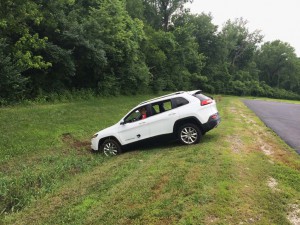The recent hacking of a Jeep Cherokee that ended with the ute running into a ditch has gotten the attention of the American motoring public and they have concerns, according to a new survey by Kelley Blue Book.
The event, which was orchestrated by Wired.com, revealed just how vulnerable today’s connected vehicles are to such technological incursions and 80% of those surveyed believe it will be a “frequent” problem in the next three years.
“Technology offers a wide range of enhanced convenience for today’s new vehicle buyers, but it also offers the increasing potential for unauthorized access and control,” said Karl Brauer, senior analyst for Kelley Blue Book.
“Cyber-security is still a relatively new area of specialization for automakers, but it’s one they need to take seriously to ensure they are ahead of the curve. If automotive engineers find themselves playing catch-up in this field, it could have disastrous results for both consumers and the industry.”
There has been a general acceptance by the motoring public that adding higher levels of connectivity to make the driving experience more enjoyable and convenient might pose some risks, recent events have hit home, according to Brauer.
(Hyundai offering do-it-yourself upgrades for Android Auto. For more, Click Here.)
“While few consumers consider vehicle hacking a major problem today, many feel it will be a real threat in the next one-to-three years,” he said. “Consumers also are highly skeptical that a comprehensive solution to prevent vehicle hacking can ever be developed, though an overwhelming majority would be willing to pay for hack-proof vehicle security if it existed.”
The group’s survey also revealed:
- 72% said they are aware of the recent Jeep Cherokee hacking incident.
- 41% said they will consider this recent vehicle hacking incident when buying/leasing their next car.
- 78% said vehicle hacking will be a frequent problem in the next three years or less.
- 33% classified vehicle hacking as a “serious” problem; 35 percent classified it as a “moderate” problem.
- 58% do not think there will ever be a permanent solution to vehicle hacking.
- 41% think pranking is the most common reason for hacking a vehicle; 37% think theft is the most common reason for hacking a vehicle.
Fiat Chrysler isn’t the only company with vehicles vulnerable to hacking, although the survey shows that FCA vehicles are now viewed as being most susceptible to being hacked and by a wide margin over GM, Ford and then Toyota. Just after the Jeep hack, another hacker named Samy Kamkar posted a YouTube video showing how he was able to exploit GM’s OnStar network.
(Consumer Reports warns of cybersecurity risks to cars. Click Here for the story.)
He built a device that can intercept communications between the OnStar RemoteLink mobile app and the OnStar service. Kamkar calls the device OwnStar, according to Wired, and it allowed him to locate, lock, unlock and remote start vehicles equipped with OnStar. Perhaps just as importantly, it gives the user the car’s make and model as well as its location.
Kamkar plans to reveal more details about the OnStar security flaw, and other car-related attacks in future videos and at DefCon, an annual security conference to be held in Las Vegas.
(To see more about how automakers are struggling to keep hackers out of cars, Click Here.)
GM in the meantime says it’s identified the weak point in its security system and has taken care of it. Kamkar shared his information with the automaker to facilitate the fix.


If only software programmers and engineers had thought about security 25 years ago, we would not have the problems we have today with lack of auto security and massive quantities of defective software and operating systems that hackers penetrate daily for profit and damage.